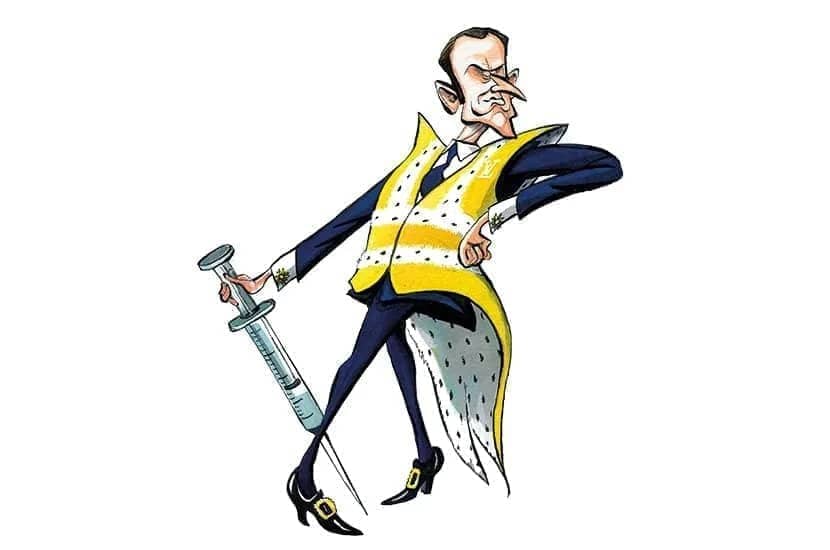Covid cases are on the increase in France, as they are in most European countries, and the scientists who have been silent for months have once more found their voice. At the weekend professor Jean-François Delfraissy called for everyone in France this autumn to have a fourth vaccination, while Alain Fischer, president of the Scientific Council, believes that masks should once more be obligatory in public transport, six weeks after the regulations requiring this were dropped.
But times have changed. Emmanuel Macron is still president but he no longer has an absolute majority in parliament and the days when the National Assembly rubber-stamped every Covid diktat emanating from the Elysée with barely a murmur of dissent are over.
One of the more incongruous aspects of France’s presidential campaign was to hear Marine Le Pen portrayed as a danger to democracy while Emmanuel Macron was held up as the paragon of liberty. Who made it a punishable offence in 2020 to leave your house without a signed declaration stating the reason for being on the street? Who introduced some of the most draconian measures in the West that effectively barred from life anyone who refused to have three vaccines? Who brazenly broke a promise to their people never to implement a law that would segregate society?
Macron deserves to be bracketed with those western leaders – Mark Rutte of Holland, Scott Morrison of Australia, New Zealand’s Jacinda Arden and Justin Trudeau of Canada – who were seized by a nasty authoritarian streak during the Covid crisis.
Macron deserves to be bracketed with those western leaders who were seized by a nasty authoritarian streak during the Covid crisis
It’s surely no coincidence that Le Pen and Jean-Luc Mélenchon scored best during the presidential and parliamentary elections in the 25 to 60 age group. This was the demographic hit hardest economically and socially by the Covid restrictions. Macron was voted back into the Elysée by the over-60s, from the outset the most supportive of his lockdowns, curfews and closures.
A year ago the controversial health pass was passed into law, at a stroke splitting the French into two factions. One third of the country was opposed to the measure, which required people to show proof of vaccination or a recent negative Covid-19 test if they wished to frequent bars, restaurants and cinemas, take a train or play sport.
Many thousands demonstrated on the streets throughout July and August. I attended several of the marches in Paris and would put the average age of the protestors in the late thirties and early forties. I heard few political opinions voiced during the demos, but according to one poll last summer the two groups most opposed to the health pass were supporters of Marine Le Pen (49 per cent of her supporters were opposed) and Jean-Luc Mélenchon (57 per cent).
Slow to initially support the protestors – unsure whether they were anti-health pass or anti-vax – Le Pen and Mélenchon became more strident in their opposition to Macron’s measure when they realised that the majority of demonstrators were on the streets to protest about their loss of liberty.
In January, Macron transformed the health pass into a vaccine pass, removing the option of taking a Covid test and categorising the double vaccinated as unvaccinated. Le Pen denounced this move as an assault ‘on our individual liberties’, and she promised that if she was elected president she would ‘re-establish vaccine freedom’.
Mélenchon’s party, La France Insoumise, was similarly opposed to the vaccine pass, demanding its dissolution in parliament along with Emmanuel Macron’s ‘health powers’. In a television interview Melenchon condemned the ‘brutal methods’ of the government in pressurising people to take a vaccine.
At the time neither Melenchon nor Le Pen could do much to oppose the pass, boasting just 25 MPs between them. They can now, having increased their seats in the National Assembly to 220. Earlier this week veteran National Rally MP Sébastien Chenu reaffirmed his party’s opposition to the pass – which was suspended in the middle of March – when it was put to him by a journalist that it could be reintroduced if Covid cases continue to rise.
The National Rally will also find support among many of the 64 centre-right Republican MPs. The party was split on the issue in January but their newly-elected leader, Olivier Marleix, was one of the MPs who voted against the vaccine pass at the start of the year, describing it as an affront to liberty and an ‘infantilising madness’.
The law permitting the vaccine pass expires at the end of next month and the government is reportedly planning to seek its extension until March 31 2023 in a bill to be presented to the National Assembly by the Minister of Health, Brigitte Bourguignon. At least that was the plan before Bourguignon failed to win her seat in the parliamentary election. She is now political history and so might be the vaccine pass when the bill is examined in parliament next week.
Macron famously declared in January that it was his intention to ‘piss off’ the French who refused to yield his authoritarian approach to Covid, a strategy that I suggested
at the time would backfire. It has, and now it’s the president who is suffering, having been stripped by the people of much of his power.







Comments